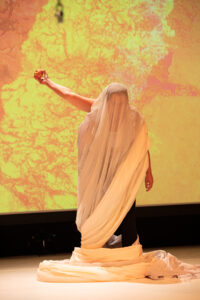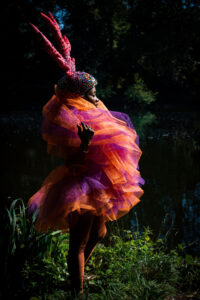DIE WAND
One morning in the mountains, a woman finds herself cut off from civilization by an invisible wall. The rest of life seems petrified, inaccessible. Only some animals and nature within her suddenly so shrunken world keep her company.
DIE WAND by Marlen Haushofer has long since become a classic that has not lost its relevance today. The ambivalent situation of the main character’s isolation, which means security and threat in equal measure, unfolds a broad spectrum of references ranging from feminist self-empowerment to the current world political situation. Last but not least, DIE WAND conjures up a time after patriarchal, capitalist society.
In an exploration of the novel, the directing team and an ensemble of eleven women have developed a chorus of movement and language that creates a contemporary overwriting of the text. On the border between the individual and the collective, the performers confront their personal “walls.” What leads to the rupture between us and the rest of the world, and what events changed everything from one day to the next? The performers talk about crossing or bumping into geographical and personal boundaries. Of the isolation that can accompany a diagnosis or the loss of a loved one. Some long to break through the wall, others have already left it behind.
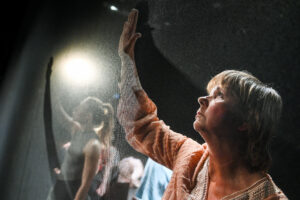
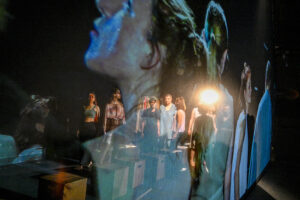
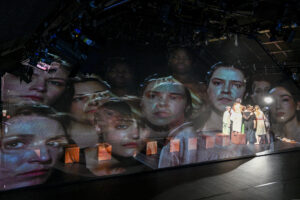
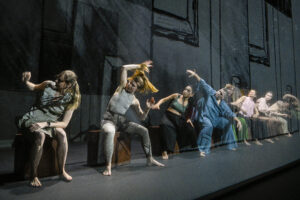
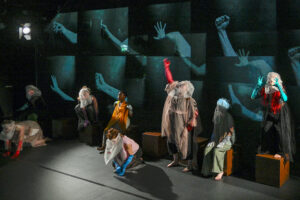
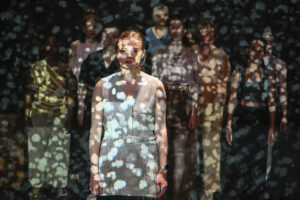
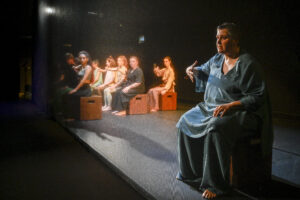
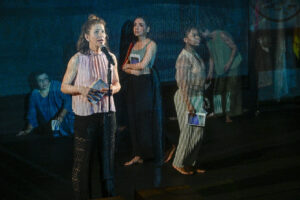
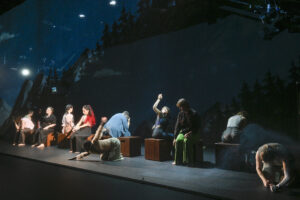
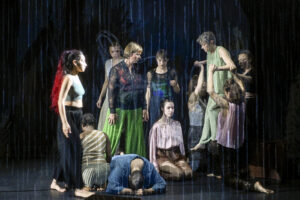
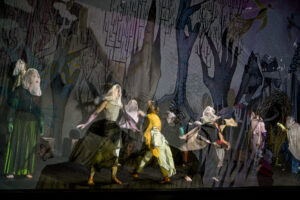
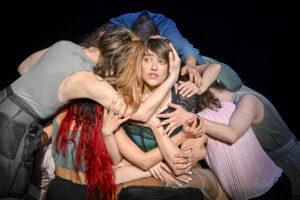
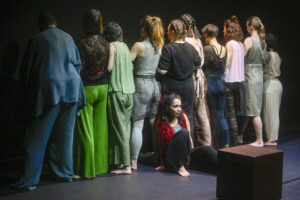
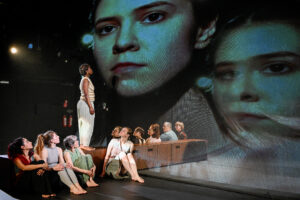
Von und Mit: kainkollektiv (Mirjam Schmuck & Fabian Lettow), Catherine Jodoin, Loxo Harazim, Tommaso Tezzele, Silvia Dierkes, Lena Iversen, Andreas Rösler, Franziska Baumann, Maria Buchmüller, Anni D., Katja Firker, Nina Houshmand, Ida Kranz, Natalia Obkhodskaia, Ute Schellenberg, Thembisile Vilakazi, Barbara Walz-Schneider, Caroline Woderich
A production of Bürgerbühne Dresden and kainkollektiv.
Black Eurydice // Schwarze Eurydike // Eurydice Noire
A Counter-Opera
Upcoming dates
-
25.04.2024 – 20:00kampnagel, Hamburg
-
26.04.2024 – 20:00kampnagel, Hamburg
-
27.04.2024 – 20:00kampnagel, Hamburg
“When Eurydice emerges from the underworld, her eyes are so blinded by the glare of the sun that for a moment, which she cannot say how long it lasts, she can see nothing but BLACK. A black, however, that contains everything: all the colors, all the contours, all the events that are now passing before her inner eye like a film running in fast motion. Just as it is commonly said to be the case at the moment of death, when your entire life passes before your eyes for the last time in a fraction of a second. This is exactly how Eurydice sees everything before her once again. Except that this moment is not her death, but her rebirth…“
(Excerpt from the text of the play)
BLACK EURYDICE, a transnational music theatre production by kainkollektiv, is about the relationship between the European foundation/invention of opera and what was systematically excluded with this foundation: the position of women & the colonial history that began at the same time (around 1600). On the basis of Europe’s first modern opera – Monteverdi’s “Orfeo” (Mantua 1607) – kainkollektiv not only gets to the (under)ground of the aforementioned exclusions, but also designs an (afro-)futuristic, feminist & postcolonial COUNTER-OPERA OF EURYDICE. In “BLACK EURYDICE” five non-European, contemporary women composers – from Iran, Cameroon, South Africa and Canada – have combined Monteverdi’s baroque music from “Orfeo”, considered the first modern opera in Europe, with visionary, contemporary, post-classical and even electronic compositions. A collective feminist composition has created together with kainkollektiv and other European and non-European performers a completely new, multi-voiced vision of the future of music theatre – also and not least as a new questioning of the patriarchal heritage of the cultural institutions of theatre/opera and as an imagination of a different history of its future.
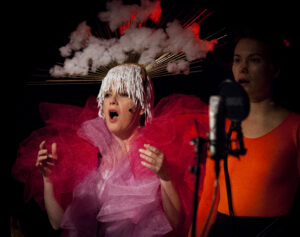
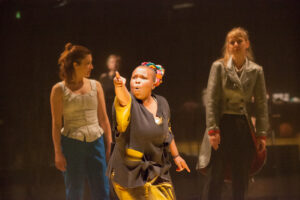
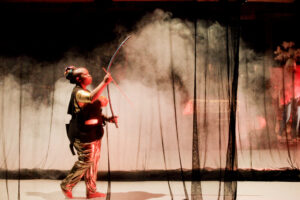
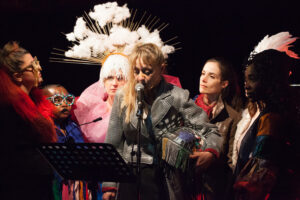
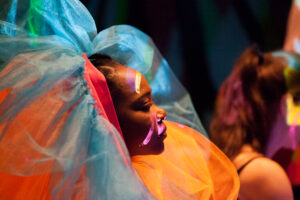
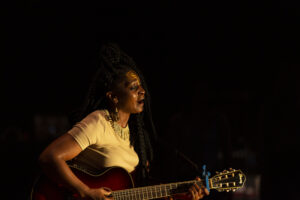
This is in parts visualised in the form of a COMIC OPERA – as a digitally painted and live-performed version of a feminist, docu-fictional “superheroine” story. kainkollektiv’s “superheroine” BLACK EURYDICE, however, is less interested in “saving the world” like her male hero counterparts. Rather, it is about her vision of a transformation of different world experiences.
“The immensely multi-layered, sensually overwhelming music theatre production ‘Black Eurydice’ is a postcolonial, multi-perspectival, feminist counter-draft to the patriarchal, Eurocentric cultural heritage. In around 90 minutes, ‘Black Eurydice’ tells with fabulous playful energy about overcoming the female and non-white silencing in a current parallel universe. However, it is above all an aesthetically highly vivid, blackly ironic musical theatre comic with exciting glimpses of the future.” (Elisabeth Einecke-Klövekorn, Bonn, 17 October 2022)
What other stories can we tell ourselves about the (yesterday’s/tomorrow’s) world that are capable of countering the (colonial) principle of exploitation and destruction that has prevailed for hundreds of years and into our turbo-capitalist present? Perhaps the one that Eurydice brings with her from the underworld, into which she descends silently in Monteverdi’s composition: from the underground, from her shadowy existence, from which we liberate her in BLACK EURYDICE and let her step into the light again. As a polyphonic figure of female experience in a polyphonic interdisciplinary and transnational ensemble of women artists who tell of what happened to Eurydice – from the time of her first forced silencing to our present, in which women’s rights – for example those laid down in the “Istanbul Convention” – are once again being seriously questioned and suspended worldwide. Or as Claudia Hötzendorfer writes in her review of the production in the Rheinische Post: “The message of kainkollektiv from the underworld is clear: society needs a feminine view of the past in order to endure the present and arm itself for the future.”
Languages: German, English & French, with English and German surtitles
From and with: Anelisa Stuurman, Anna Homann, Antje Kuhfeld, Bianca Kunzel, Catherine Jodoin, Edith Voges Nana Tchuninang, Fabian Lettow, Hannah Busch, Henning Streck, Immanuel Bartz, Kerstin Pohle, Melissa Muller, Mirjam Schmuck, Nima Aghiani, Pélagie Alima, Richard Behrens, Sarah Bigdeli Shamloo, Silvia Dierkes, Vanessa Chartrand-Rodrigue, Zdravka Ivandija Kirigin
Funded by the Hauptstadtkulturfonds, the Kunststiftung NRW, the Ministry of Culture and Science of the State of North Rhine-Westphalia and the City of Bochum. A project by kainkollektiv in co-production with tak Berlin and FFT Düsseldorf. A project by kainkollektiv in coproduction with tak Berlin and FFT Düsseldorf.

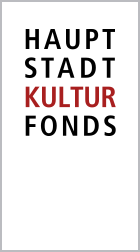



KASSIA & THE NEW CONVENT(ION)
a performative archive
The composer, poet and Byzantine abbess KASSIA is considered the first European composer whose works have survived to this day. KASSIA was born in Constantinople in the year 810. She is an enigmatic personality not only as a musician, but also as a writer. More than 250 of her texts have been preserved in the form of epigrams. Moreover, Kassia appeared as a political figure in her time, rhetorically opposing the emperor Theophilos in his search for a bride. Finally, she founded a women’s monastery on the seventh hill of Constantinople, today’s Istanbul. KASSIA is a kind of early feminist and cosmopolitan role model.
For more than one and a half years, programmers have been working together with media and performance artists to program an online archive on Kassia that aims to open up the possibilities of digital empowerment spaces for the issues of women’s rights (Istanbul Convention) and new queer feminist practices and narratives. The starting point of the joint venture, which has been supported by many different contributors, has been a digital conference on KASSIA in 2021.
As the last part of the multidimensional project around KASSIA, consisting of an opera performance and the digital KASSIA conference, the performative archive KASSIA was finally opened in 2022. The archive portraits the different parts of the project in a bundled form and links them interactively. The KASSIA archive aims to make the Kassia cosmos accessible, whereby all media developed in the previous project parts – music, texts, performances, lectures, images, portraits, etc. – have become components of this digital space. Visitors are invited to experience contributions from over 40 international musicians, poets, activists, and scholars, and to leave their own traces in Kassia’s new digital monastery.

A project by kainkollektiv, MIREVI (HSD), sputnic visual arts (et al.), illustrations: Verena Herbst
From and With: Agata Siniarska, Agnieszka Różyńska, Alexander Giesbrecht, Alexander Lingas, Alice-Mary M. Talbot, Amal Omran, Anna-Maria Holtmann, Anna Majewska, Anna Pekaniec, Annalyzer / Anelisa Stuurman, Anthi Karra, Artur Gerz, Aylin Vartanyan, Ayşenur Aydın, Barbara Harbach, Ben Fischer, Betül Elarslan, Beyza Keskin, Burak Özdemir, Burcu Kalpaklıoğlu, Burcu Özdemir, Cecily Hennessy, Christine Yohannes, Çiğdem Haliloğlu, Daniel Glomberg, David Nowottnik, Dominika Bremer, Ebru Nihan, Egana Djabbarova, Fabian Lettow, Füsun Ertuğ, Gülşin Ketenci, H. Muallâ Görkey, Hannah Busch, Hans-Martin Dederding, Hatice Zehra Selman, Hazal Halavut, İremnur Çelebi, Işıl Başak Arabacı, Ivana Druzetic-Vogel, Iza Gawęcka, İzel Zümrüt Durmaz, Jale Karabekir, Kaan Tanhan, Karin Karakaşlı, Katarzyna Słoboda, Katarzyna Żeglicka, Katia Savrami, Kerstin Pohle, Klara Diedrichs, Kübra Gümüşay, Kurt Sherry, Lee Cockshott, Liz James, Łucja Iwanczewska, Lydia Ziemke, Maja Lee Langvad, Malte Jehmlich, Marta Jalowska, Melissa Müller, Meral Akkent, Merve S. Öztürk, Milan Vukašinović, Mirjam Claaßen, Mirjam Schmuck, Mithu Sanyal, Monika Kwaśniewska-Mikuła, Muaz Semih Güven, Narîn Yukler, Niki Tsironi, Niklas Tluk, Nils Voges, Nisa Nur Arslan, Ömer Kaan İşleyen, Patrick Kruse, Patrycija Kowanska, Paulina Kramarz, Rümeysa Çamdereli, Sara Bigdeli Shamloo, Selin Su Bağcı, Serkan Yıldırım, Serra Akcan, Suna Kafadar, Sarah Plochl, Tang Siu Wa, Thomas Arentzen, Tuğçe Aydın, Vanessa Chartrand-Rodrigue, Verena Herbst, Wanda Künzel, Yeşim Koçak, Young-Won Song, Yunus Margaz, Zeynep Kübra Alkazak, Zuzanna Berendt
In cooperation with the Heinrich Böll Foundation and the Istanbul Gender Museum.

Funded by the Ministry of Culture and Science of the State of North Rhine-Westphalia in the Medienkunstfonds and by the City of Bochum.



KASSIA & THE NEW ISTANBUL CONVENT(ION)
A DIGITAL CONFERENCE SERIES
The composer, poet & Byzantine abbess KASSIA, who lived in Constantinople in the 9th century, is considered as the first European female composer whose musical works have been conveyed to our times and still play an important role in the history of music today. Kassia was an extremely emancipated woman in her time. She dared to challenge Emperor Theophilos of Constantinople during the “bride search” organised for him with theological acumen. She did not want to marry and used her fortune to found a convent for women in Constantinople instead. In her self-determined lifestyle, Kassia appears as a kind of role model.
kainkollektiv and the Turkish-German composer Burak Özdemir together with his magnificent baroque orchestra Musica Sequenza have taken Kassia as the starting point for a (post-)feminist opera – the SONGS OF CARE(VOLUTION) – in co-operation with the Gender Museum Istanbul between NRW, Berlin and Istanbul.
The performance, however, was integrated into an analogue and digital conference series that brought together scientists, activists and artists from Germany, Poland, Turkey, Sweden, Cameroon, South Africa, the USA and other countries in 2021. The project makes an explicit contribution to the current feminist debates: also as a clear sign of solidarity and resilience in the light of the rejection of the Istanbul Convention on women’s rights by the governments in Poland and Turkey.
From September to October 2021 the digital conference series with international speakers and in cooperation with the Gender Museum Istanbul under the direction by Meral Akkent, Zuzanna Berendt and Anna Majewska from the curatorial collective Pracownia Kuratorska from Krakow, universities from Germany, Poland and Turkey and in particular with the Heinrich Böll Foundation, the Goethe Institute Krakow & the Goethe Institute Istanbul, took place in five online sessions.
All components of the Kassia project reflect and comment upon the current feminist debates and discourses in different countries, which are currently taking the form of huge demonstrations and women’s strikes, but also of smaller initiatives between science, activism, care work and art, and link them to the themes and the art and care work of Kassia. The aim of the NEW ISTANBUL CONVENT(ION) in reference to Kassia’s medieval women’s monastery is a hybrid, digital-analogue format between science, art and activism, in which new narratives of a (post-)feminist future can be spun and designed. With artists, activists, academics and students from Poland, Germany, Turkey and in alliance with accomplices worldwide from the already existing international networks of all co-operation partners, the KASSIA project creates a dialogue that opens up for transnational, transdisciplinary and queer-feminist future vision of which Kassia is the patron.

From and With: Agata Siniarska, Agnieszka Różyńska, Alexander Lingas, Alice-Mary M. Talbot, Amal Omran, Anna Majewska, Anna Pekaniec, Annalyzer / Anelisa Stuurman, Anthi Karra, Artur Gerz, Aylin Vartanyan, Barbara Harbach, Ben Fischer, Burak Özdemir, Burcu Kalpaklıoğlu, Burcu Özdemir, Cecily Hennessy, Christine Yohannes, Dominika Bremer, Ebru Nihan, Egana Djabbarova, Fabian Lettow, Füsun Ertuğ, Gülşin Ketenci, H. Muallâ Görkey, Hannah Busch, Hans-Martin Dederding, Hazal Halavut, Iza Gawęcka, Jale Karabekir, Karin Karakaşlı, Katarzyna Słoboda, Katarzyna Żeglicka, Katia Savrami, Kerstin Pohle, Klara Diedrichs, Kübra Gümüşay, Kurt Sherry, Lee Cockshott, Liz James, Łucja Iwanczewska, Lydia Ziemke, Maja Lee Langvad, Malte Jehmlich, Marta Jalowska, Melissa Müller, Meral Akkent, Merve S. Öztürk, Milan Vukašinović, Mirjam Claaßen, Mirjam Schmuck, Mithu Sanyal, Monika Kwaśniewska-Mikuła, Narîn Yukler, Niki Tsironi, Niklas Tluk, Nils Voges, Patrycija Kowanska, Paulina Kramarz, Rümeysa Çamdereli, Sara Bigdeli Shamloo, Serra Akcan, Suna Kafadar, Sarah Plochl, Tang Siu Wa, Thomas Arentzen, Tuğçe Aydın, Vanessa Chartrand-Rodrigue, Verena Herbst, Wanda Künzel, Yeşim Koçak, Young-Won Song, Zuzanna Berendt
A co-production of kainkollektiv, Burak Özdemir, the Gender Museum Istanbul, Pracownia Kuratorska and the Heinrich Böll Foundation.


Supported by the Kunststiftung NRW, the Heinrich Böll Foundation, the Ministry of Culture and Science of the State of North Rhine-Westphalia, the Fonds Darstellende Künste with funds from the Federal Federal Government Commissioner for Culture and the Media, the NRW KULTURsekretariat, the City of Bochum.





KASSIA – SONGS OF CARE(VOLUTION)
EINE CYBORG OPER
von kainkollektiv, Burak Özdemir & Musica Sequenza, Gendermuseum Istanbul, Ringlokschuppen Ruhr, tak Theater Aufbau Kreuzberg Berlin & Kampnagel Hamburg
Die Komponistin, Dichterin & byzantinische Äbtissin KASSIA, die im 9. Jahrhundert in Konstantinopel lebte, gilt als erste europäische Komponistin, deren musikalische Werke überliefert worden sind und bis heute eine wichtige musikgeschichtliche Rolle spielen. Zudem gründete Kassia auf einem der sieben Hügel Istanbuls ein Frauenkloster, nachdem sie einen Heiratsantrag des Kaisers Theophilos zurückgewiesen hatte. Kassia erscheint damit als eine Art urfeministisches Role Model. Diese „Powerfrau“ nehmen kainkollektiv und der türkisch-deutsche Komponist Burak Özdemir zusammen mit seinem grandiosen Barockorchester Musica Sequenza als Ausgangspunkt für eine (post-)feministische Oper – den SONGS OF CARE(VOLUTION) –, die in Zusammenarbeit mit dem Gendermuseum Istanbul sowie Wissenschaftler*innen, Aktivist*innen und Künstler*innen aus Deutschland, Polen, der Türkei und weiteren Ländern zwischen NRW, Berlin und Istanbul entstanden ist.
Grundlage für die von kainkollektiv inszenierte Performance-Oper bildet die vielschichtige Neu-Komposition der Werke Kassias durch Burak Özdemir und sein Orchester Musica Sequenza, in der die extrem alten, kulturelle und geographische (Klang-)Grenzen überschreitenden Werke Kassias mit alten (und elektronischen) Instrumenten auf eine zeitgenössische Weise völlig neu interpretiert und für unsere Gegenwart zugänglich gemacht werden. Zusammen mit der guatemaltekischen Sopranistin Diana Ramirez, der südkoreanischen Tänzerin Young-Won Song & der kanadischen Tänzerin Catherine Jodoin sowie der syrischen Schauspielerin Amal Omran entsteht zwischen Musik, Oper, Text, Tanz, Film und Performance ein schillerndes Porträt der Künstlerin Kassia ebenso wie der west-östlichen Grenzlandschaften Europas, aus denen sich ihre musikalischen Einflüsse speisten und die aktuell wieder tief in die Krise patriarchaler und nationaler Politiken geraten sind. In einer Zeit, in der die Regierungen in Polen und der Türkei die Istanbul Kovention für Frauenrechte in Europa verlassen, geht es darum, das Vermächtnis Kassias als „erster feminstischer Künstlerin“ neu zu befragen und für die Zukunft auszuloten.
Im Aufgreifen, Übermalen und Weiterspinnen der Kompositionen, Dichtungen sowie der Biografie von KASSIA werden das Musiktheater und die Künstlichkeit der Oper, die selbst eine Art Cyborg-Gattung des Theaters ist und Cyborg-Künstler*innen mit außergewöhnlichen Stimmen und Körpern hervorbringt, zum produktiven Raum der Erforschung hybrider, mithin queerer, cyborghafter Existenzen und ihrer unterschiedlichen Verkoppelungen – über Zeiten, Räume, Sprachen und Klangwelten hinweg, von Byzanz bis in die (europäische) Gegenwart und Zukunft. Denn die neue CYBORG OPERAS Serie von kainkollektiv, die sich hier mit KASSIA fortsetzt, verfolgt das Erzeugen eines Repertoires an theatralen Gesten, narrativen Dramaturgien und insbesondere Liedern, Arien, Gesängen, Lauten und Schreien – jenen SONGS OF CARE –, die neben allen singulären Ausdrucksformen auch stets die Stelle markieren, an der die Einzelnen mit ihren Umwelten verbunden sind und sich neue, mithin kosmische Konfigurationen ergeben – so wie es in den kosmologisch-theologischen Entwürfen und Kompositionen Kassias schon vor mehr als 1.000 Jahren zum Ausdruck gekommen ist und deren Wiederentdeckung darum heute mehr denn je lohnen: Wie klingt eigentlich (post-)feministische Oper?
Susu/Kassia:
I have questions: To write or not to write? To sing or not to sing? Questions that can be heard in our ears. How and why to write poems, plays, songs in revolutionary times? In times of crisis? In times of oppression? Why poems, what songs, when women are silenced? When children are silenced? When animals, plants, stones, dreams are silenced? When does silence begin? When do we escape the silence? When is silence stone, sand, gold, breath?
For silence, like darkness, just is. But how can it be conveyed?
When? It takes time, times, all times. A time to fight. A time to write. And a time in between that combines the two. [Auszug aus dem Stücktext von kainkollektiv]
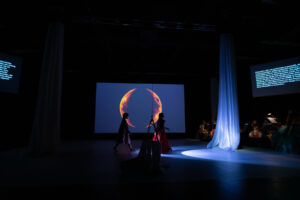
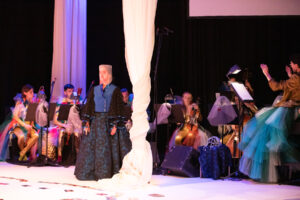
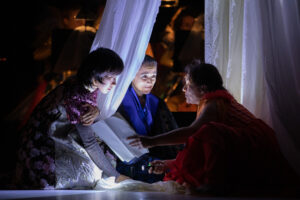
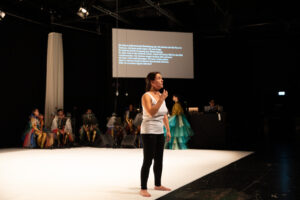
Von und mit: Alexander De Tey, Amal Omran, Annie Gard, Ana Mikulić, Burak Özdemir, Burcu Özdemir, Catherine Joidon, Chang Yoo, Diana Ramirez, Elisabeth Champollion, Emine Schmuck, Fabian Lettow, Hannah Busch, Jochen Röth, Linda Mantcheva, Melissa Müller, Mirjam Schmuck, Norbert Wahren, Pedro Doria, Sebastian Flaig, Theo Small, Tung-Han Hu, Young-Won Song und Zdravka Ivandija Kirigin u.v.m.

Koproduzent*innen und Gastspiele: kainkollektiv, Burak Özdemir/Musica Sequenza Orchestra, Gender Museum Istanbul, Pracownia Kuratorska, Ringlokschuppen Ruhr, kampnagel Hamburg, tak Theater Aufbau Kreuzberg und Theater im Ballsaal Bonn.




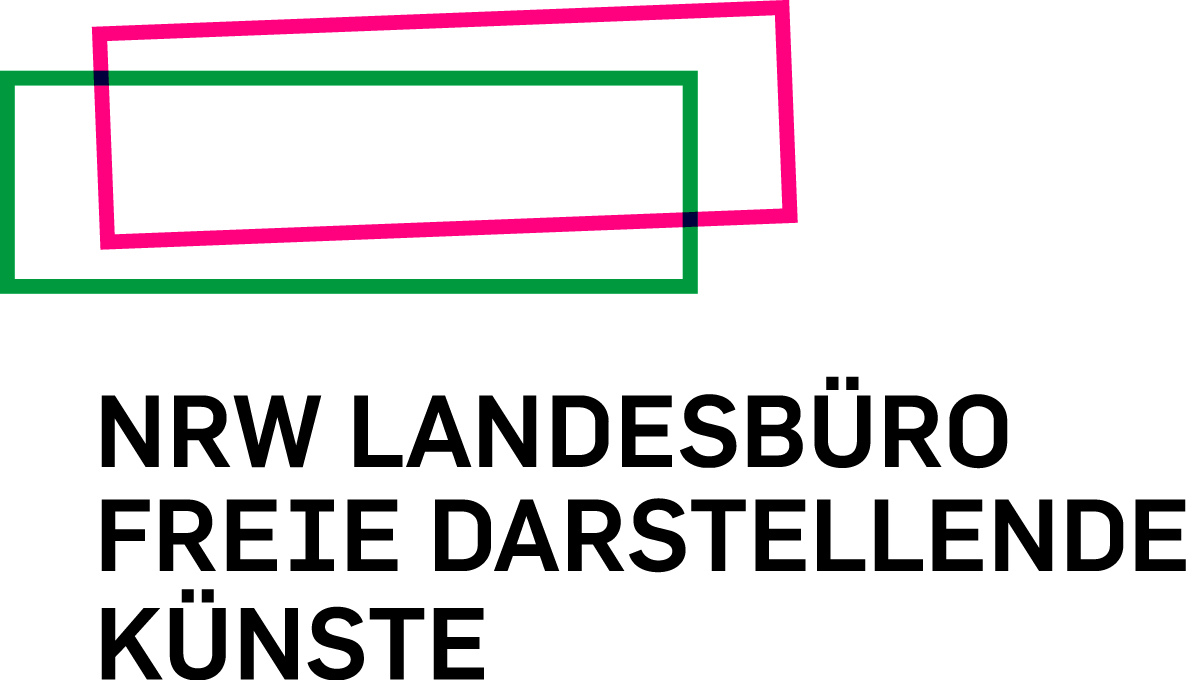

Gefördert von der Kunststiftung NRW, dem Ministerium für Kultur und Wissenschaft des Landes Nordrhein-Westfalen, der Heinrich-Böll-Stiftung, vom Fonds Darstellende Künste aus Mitteln der Beauftragten der Bundesregierung für Kultur und Medien, dem NRW KULTURsekretariat, der Stadt Bochum
WE TRAVEL THE SPACE WAYS
A digital travel performance in search of the “future of the human” by kainkollektiv & parts of the “Is this a human?” ensemble 2020/21.
The starting point of the online performance project is the titular question of another production: “est – ce un humain? / Is this a human being? / Is this a human”. For this, kainkollektiv (Germany) want to work with parts of the ensemble from “Ist das ein Mensch?” (Cameroon & Madagascar) want to open a digital space to which we invite everyone who is not afraid of dancing over abysses. It is about saying goodbye to certainties and letting the abyss of story(s) that inevitably separate us from each other and just as inevitably connect us to each other enter into the reality of our lives.
After the rehearsals for “Is this a human?” in March 2020 were suddenly interrupted due to the pandemic, the kainkollektiv would now like to reconvene with some of the actors and negotiate the “state of affairs” locally and globally.
In the form of a work in progress, we want to explore the possibilities between art, care & digital live cutting. We want to continue to connect and stay connected across continents. The current situation in the Corona crisis has revealed new potentials of linking theater & digital techniques for this. In WE TRAVEL THE SPACE WAYS we experiment with (digital) live editing in order to cut together places, stories, traces & positionings in a far-reaching aesthetic-medial, but also social & political strategy, which – in a positive as well as negative sense – turn out to be incisive for local-global coexistence on earth.
How can we cut together such different realities between analog & digital, documentation & fiction, art, care & activism, media, places/sites & actors* and design net-works in real time? We embark on a journey into the digital space that runs through our present like a rift between different realities to find answers to these questions – somewhere between the virtual movements of a (street) dance ritual and the alien songs of a space opera. What will actually have been in the future of the dawned age we call ANTHROPOCEAN: a HUMAN? And who will WE have been (in the future)?

From and With: kainkollektiv (Mirjam Schmuck, Fabian Lettow), Njara Rasolomanana, Pélagie Alima, Mariette Nancy Nko, Nicolas Moumbounou, Nils Voges (sputnic), Zora Snake Company
In cooperation with the National Theater Mannheim.
OVERDOSE
THE UNFINISHED SHOW OF PAIN AND JOY
An empty stage populated by a group of people: A writer, a composer, a painter, a narrator, ancient figures and contemporary performers in a continuous loop of corona interruption. In the centre of the vast space is the oracle, an empty, transparent box that they all encircle, enter and question together. Three travellers appear, preoccupied with their own concerns and emerging from their own personal isolation. Can the oracle help them? Can it give them answers to their questions? And will it show them who they really are? Or is the oracle itself long dead, closed, a faded myth from the stories of Greek antiquity with which European theatre once began?
Seven performers, three languages and a few pains and joys later that are shared here – boat people project, Collective Ma’louba and kainkollektiv have created a fragmented, constantly (self-)interrupting theatre journey in filmic form that tells of voiceless singers, torn actors and performing non-performers – a swan song to the theatre in pandemic times and at the same time a new questioning of the ancient oracle about its continuation, about the theatre of the future!
The project was developed over a period of 12 months in collaboration between the three collectives and a diverse group of theatre makers from Syria and Germany.
A polyphonic streaming performance in Arabic, English and German.
The online premiere was available to watch for free on the official YouTube channel of vier.ruhr on 9 April 2021 at 8 pm.







From and With: Waseem Alsharqi, Immanuel Bartz, Reimar de la Chevallerie, Florian Lauss, Bayan Layla, Fabian Lettow, Amer Okdeh, Amal Omran, Mirjam Schmuck, Omar Mohamad, Birte Müchler, Nina de la Chevallerie
Funded by: Ministry of Culture and Science of the State of NRW, the German Federal Cultural Foundation. As part of NEUE WEGE by the Ministry of Culture and Science of the State of North Rhine-Westphalia in cooperation with the NRW KULTURsekretariat and with funds from the Federal Theatre Prize.
Sturm!
The winds seem to be favorable when, in 1607, three ships set sail from London to make the perilous crossing across the Atlantic to America’s “New World” to found the first colony in transatlantic colonial history at Jamestown, Virginia. But one of the three ships, the “Sea Venture”, gets caught in a storm and sinks. Parts of the crew save themselves on one of the islands that will later be called Bermuda. The castaways reach Jamestown ten months late, but conditions there are catastrophic, diseases are rampant, many do not survive the winter.
Shakespeare is said to have met some of the returnees in the sailors’ taverns of London’s West End; they tell him about the confusion of the “New World. Their “colonial sailor’s yarn” inspires Shakespeare to write his last play THE TEMPEST, which he publishes in 1611, a few years before his death.

THE STORM is considered a comedy with a happy ending and Shakespeare’s most personal play. It tells the story of the magician Prospero, the rightful Duke of Milan, who loses his dukedom due to an intrigue of his brother, has to flee, gets caught in a storm at sea and is stranded on an island. There he lives together with the magical creatures that serve him. When his scheming brother also arrives on the island by his hand, a confusion unfolds, at the end of which an intrigue is resolved and all conflicts seem to be pacified. In Prospero’s epilogue, which he addresses directly to the audience and with which he literally departs, one has thought to recognize Shakespeare’s own farewell speech from the theater. With Prospero the magician, Shakespeare the theatrical magician also departs from the world (theatrical) stage.
But perhaps this departure can also be discussed and problematized in terms of globalization as we understand it today, with the violent exploitation of the earth and the living beings it inhabits. Shakespeare’s play is aware of this connection very early on. But how far-reaching the title he chose, “The Tempest”, aims into the heart of the dynamics of globalization, can only be fully appreciated today – in a time of turbo-capitalism and climate change, in which pandemics, financial storms and tsunamis rage across the planet and thus sweep away entire islands (economically as well as geographically) like the island on which Prospero founded his empire.

In STURM! the Bochum-based kainkollektiv, together with the PRINCE REGENT THEATRE and a team of three actors, wants to retell Shakespeare’s famous last play once again and in a completely new way.
From and With: Alexander Steindorf, Edith Voges Nana Tchuinang, Rasmus Nordholt, Mirjam Schmuck, Fabian Lettow
Supported by the Foundation of Sparkasse Bochum for the Promotion of Culture and Science.
GAIA
a Cyborg Opera
On June 27, 2020, the new production GAIA by kainkollektiv will celebrate its premiere. After the pandemic did not allow the originally planned premiere at the Ruhrfestspiele Recklinghausen, it was rethought – together with sputnik – and creatively rescheduled to create an online version with live moments.

“My name is Gaia, mother-goddess of the earth. My name is Demeter, mother-goddess of fertility. And I am Isis, mother-goddess of species. We are not saints, but earth-bound ones. Not spiritual principles but principles made flesh, not heavenly evasions but earthly entanglements. We have come to take back what has always been ours. But take heed, we are not given to joking.” (Excerpt on BITCH MOTHER MANIFESTO)
Gaia in mythology is the primordial Mother Earth, the all-encompassing feminine principle that connects all things that are. Gaia creates and destroys. Gaia gives birth and multiplies.
The 10 female artists from Canada, Cameroon, Iran, Croatia, France and Germany create a space of possibility in GAIA. . A space in which art and children can exist together. In this space they expose themselves with their questions, doubts, strengths and search movements.
A story is told in the near future. A mysterious phenomenon is appearing all over the world: Children fall into a deep sleep. Nobody can explain the reason. In this setting, a group of mothers emerges who interpret this phenomenon in their own unique way. What they have in common: they are (non-) mothers and artists who are fed up with the state of the world. The current crisis makes them reflect on individual choices and life circumstances.
Fictional portraits are drawn that are projections of the artists themselves. Of who they are, of what they (don’t) want to be, of how they feel they are seen, and of how they (don’t) want to be seen. What does it mean to be an artist and a mother?
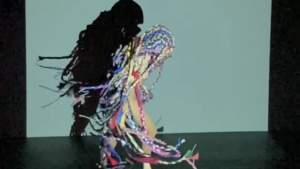
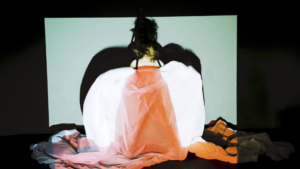
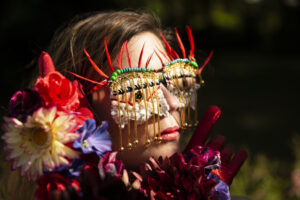
Due to the crisis, the women are tied to their homes, but still connected through the Internet, and so they prepare a fantastic revolution that their BITCH MOTHER MANIFESTO is based on. In the process, they rediscover the arts that have accompanied their lives for so long. Exploring their mystical origins and realizing the transformative power that art can have. In the scenography of their kitchens, bathrooms, beds and living rooms, the women transform themselves into mythical, hybrid, hermaphroditic figures/cyborgs – a new planetary species – that may even have the abilities to awaken the sleeping children and lead them into a future vision of a new world program: GAIA.
In English, French and German.
From and With: Silvia Dierkes, Catherine Jodoin, Edith Voges Nana Tchuninang, Vanessa Chartrand-Rodrigue, Mirjam Schmuck, Sabrina Bohl, Sara Bigdeli Shamloo, Kerstin Pohle, Bianca Künzel, Zdravka Ivandija Kirigin, Hannah Busch
A project of kainkollektiv in coproduction with Ruhrfestspielen Recklinghausen and tak Berlin.

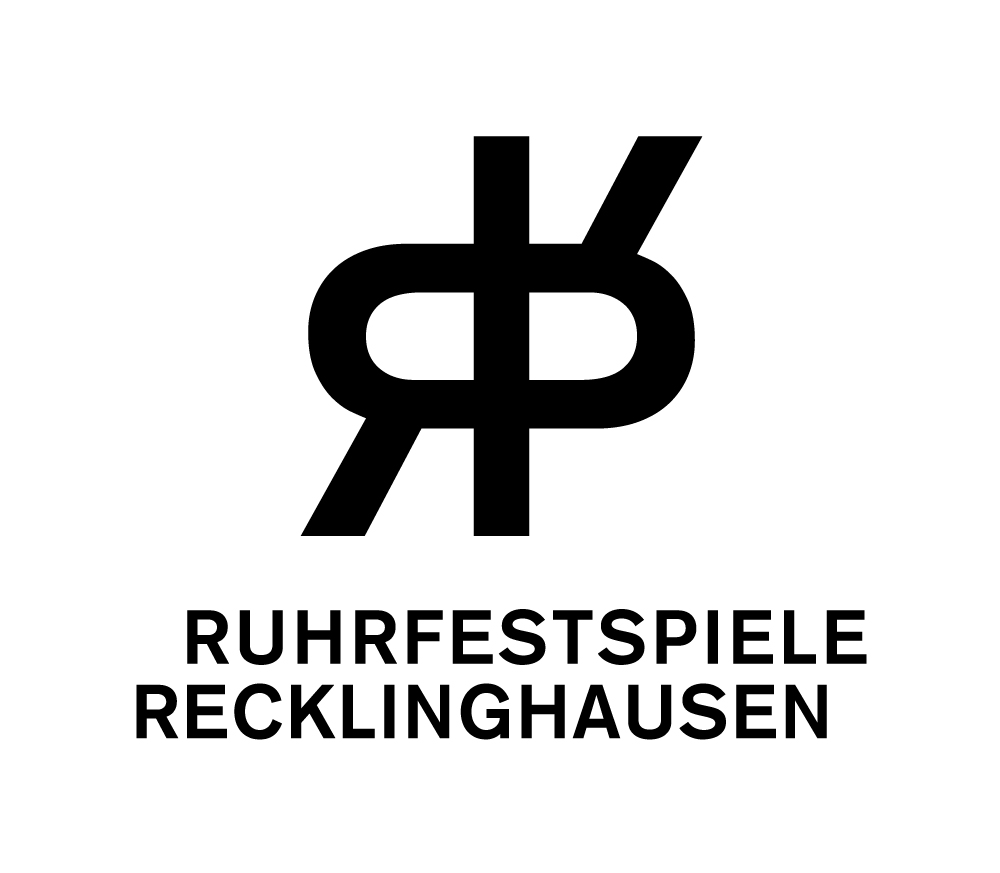
Funded by the Performing Arts Fund, funded by the Federal Government Commissioner for Culture and the Media, the Ministry of Culture and Science of the State of North Rhine-Westphalia, the North Rhine-Westphalia State Office for the Independent Performing Arts, and the Regionalverband Ruhr.




Decameron
The Dark Side of the Zoom.
kainkollektiv embarks on a virtual journey in search of its lost ensemble, scattered to the winds by the virus of the present. A cinematic déjà vu that leads through the European landscapes and far beyond, zooming deeper and deeper into the dark heart of Europe – into the backside of the European Dream, which, as we all know, has been giving birth to monsters for a long time. What will our homecoming look like, when one day we will return from the home office to reality? To which reality? How, where and when will we all meet again?
Link to ‘Decameron. The Dark Side of the Zoom’ on the YouTube channel of vier.ruhr: https://www.youtube.com/watch?v=Fg_dZY7OGO8
From and With: kainkollektiv (Mirjam Schmuck & Fabian Lettow), Nils Voges, Silvia Dierkes, Łukasz Stawarczyk, Pélagie Alima, Zora Snake, Sara Bigdeli Shamloo, Rasmus Nordholt-Frieling.
Funded within the framework of NEUE WEGE by the Ministry of Culture and Science of the State of NRW in cooperation with the NRW KULTURsekretariat.



